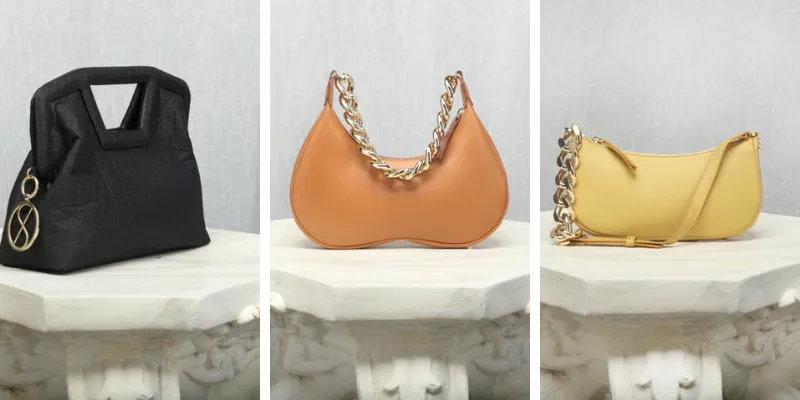Entrepreneur Anjana Arjun’s sustainable brand uses apple skin, cactus leather to make handbags
Sarjaa, conceptualised by Anjana Arjun, daughter of Kollywood superstar Arjun Sarja, is a sustainable fashion company that creates handbags using fruit leathers, ethically-sourced silks and cottons, recyclable aluminium, and prints designed by local artists.
Anjana Arjun became a fashion designer quite by accident. She always wanted to be a photographer, and with this interest applied to the LaSalle College of Arts in Singapore. But the only course available was in fashion media and industries, and since it had to do with the arts, she thought she’d find her niche.
“The course broadened my perspectives about the industrial and business aspect of fashion. My thesis was on fashion as a business, where I had to make a business pitch with marketing, financial strategies, focus on the product and packaging and this clinched it for me. I wanted to broaden my knowledge in the field,” she tells HerStory.
She applied to the Parsons Institute of New York and graduated in 2015 majoring in fashion marketing and interning with Porenza Schouler, and worked with Tahari before deciding to return to India in 2019.
Creating awareness around sustainable fashion

From the Sarjaa collection
Chennai, her hometown, did not offer her much choices, and this got her brainstorming with her family to start off on her own.
“I've always been interesting in sustainability and sustainable materials in fashion. As someone really close to animals and nature, it’s very dear to me. Also, fashion being the third most polluting industry in the world, I wanted to create awareness around sustainable fashion in India,” Anjana says.
Instead of the jutes and linens, Anjana decided to concentrate on sustainable materials one would associate style and chic with. Initially, she thought of designing apparel, but after research into plant skins and fruit leathers, she decided to start small, and says handbags made the best sense.
“I went with my family name, Sarjaa, though with a double A to reflect my name. Also, it’s the name of my grandfather and my father’s last name. Additionally, Sarja is the name of the tree associated with my celestial start, the moola nakshatra. The tree is said to give the grower a long and happy life, and that’s sustainability for me,” she explains.
Manufactured in its facility in Karnataka, Sarjaa was launched last month with six designs in its first collection. They include:
Pracheen – A classic handbag made with apple skin leather, with the inner lining featuring ethically-sourced Eri silk, while the print lining is sourced from the designs of a renowned henna artist in South India.
Sebu – Sebu, which means apple in Kannada, is made with apple skin leather. The lining is organic cotton and the zips are made from 70% post-consumer recycled metal.
Dua – This spacious tote is a go-to work bag, with roomy zip compartments and pockets.
Punya – This can be used as a clutch or a cross-body bag and can be paired with both Western and Indian wear. Its magnetic closure button is made of recyclable aluminium and the inner lining of the bag is made of organic cotton.

Anjana Arjun
Kala – The bag features elements made with leather derived from fruit waste, along with other organic materials.
Kenti – This mini bag is inspired by the kettlebell with its form (ergonomic handle) and design.
She admits that apple leather was difficult to procure, but cactus and pineapple leather are easy to source but really tough to work with.
She points out that each leather is different and to match it to a particular design is a challenge.
“My team and I pushed ourselves to the maximum to make it work. There’s no use of PVC or toxic chemicals in the process, and I can proudly say we are 80% sustainable and striving to make the process 95% sustainable,” she adds.
Sarjaa uses plantable seed paper in its packaging that can be used to grow plants.
“We have tried to be as transparent as possible on our sustainability efforts and Sarjaa is for people who care for the planet and an environment-friendly way of living. We also aim to create awareness in this direction,” says Anjana.
The bags are priced at a premium–between Rs 24,999 and Rs 44,999, and available on its website, sarjaa.in.
“I think I can call Sarjaa my dad’s business equally and it’s just my brains working for him. I couldn’t be more thankful to my family in supporting me to take this concept forward,” she concludes.
Edited by Megha Reddy








